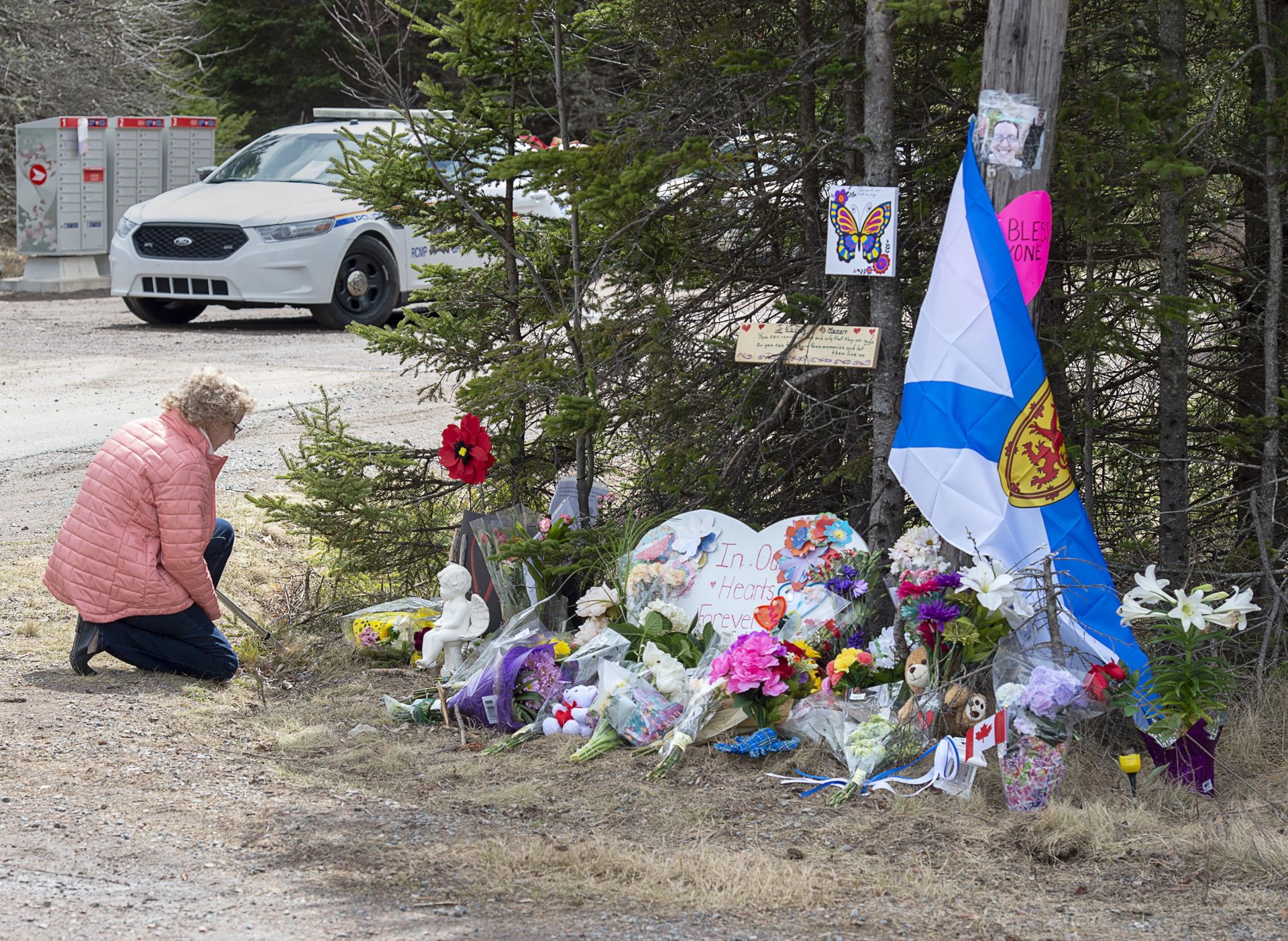It hardly seems real. As my household got up on Sunday, April 19, and made coffee and fed the pets, had breakfast and offered worship online from the empty sanctuary of the United church in Oxford, N.S., the worst mass shooting in Canada’s history was unfolding.
Turns out, even before church had started, four people were dead in the Wentworth Valley, 20 minutes down the road from the church. We would later learn the rampage started Saturday night over the county line in the tiny community of Portapique. We would also learn of more victims in communities down the TransCanada Highway.
This happened close to home in familiar places. With 22 victims, many of us know someone who was affected by the tragedy. “There’s definitely a sadness no matter who you talk to,” says Barb Palmer, the municipal councillor for District Six in Cumberland County, which includes Wentworth. “Even if they don’t know the people directly, they know family of the people who passed away. Everyone is sad and in shock.”
Tragedy is such an inadequate word for what happened, but does a word exist to describe the combination of heartbreak and devastation and destruction? How do we express the pain that will become woven into the fabric of so many lives?
More on Broadview: The logistics of loss during COVID-19
The killings happened in rural Nova Scotia, but not just any rural area: one far from Halifax and the tourist hotspots of the Eastern Shore, Peggy’s Cove and the Annapolis Valley. People pass through our area on their way to those places or to their cottages. But we live here, year after year, season after season, and our way of life — especially for those born and raised here over generations — has been shattered. It’s incomprehensible.
This event puts into question the very things we take for granted: answering the knock on the door, going for a walk along the road, stepping up to a driver who stops to ask for directions, running over to the neighbours to help. Even as I write this, the door on my house is unlocked. This deeply rooted trust is shattered. Our safety destroyed by evil. How do we deal with that?
“There’s a lot of people wrestling with that question,” says Rev. Valerie Kingsbury of First United in Truro. She says people are feeling very vulnerable. “Even though they know this is not the norm, there is that visceral response to having our serenity, our space invaded in such a way that we feel unsafe.”
A member of the congregation I serve has a daughter who is a paramedic and she worked that long, horrific night. “Everyone she worked on survived,” my friend wrote in an email. The unwritten words: My daughter survived. But so many other daughters, sons, mothers, fathers, brothers and sisters did not. This reminded me of something Sherie Hodds of the Atlantic School of Theology said earlier this month in an online conversation about leadership: Grief and gratitude are two sides of the same coin.
This deeply rooted trust is shattered. Our safety destroyed by evil. How do we deal with that?
I don’t want to paint an idealized picture of where I live. Nova Scotia has its share of murder, murder-suicides and domestic violence, and the rural areas certainly are no exception. But the sheer scale of this, the number of dead, the multiple crime scenes, the seemingly randomness of the violence is new. I’m not alone in lamenting that Nova Scotia, my home, is now the location of Canada’s worst mass killing.
Everything feels different; tainted. Walking along my busy rural road on Monday afternoon, a car approached and for the first time, I saw it as something potentially sinister. So now there’s fear and despair — will we ever feel safe and friendly again? I choose to focus on what Rev. Kingsbury told me: “We will rebuild.”
It may take longer because of the pandemic. Our communities, including my congregation, can’t give or receive the physical contact we need to console one another while in isolation. “Part of what’s very innate in a rural culture, in particular, is a sense of community and being together. It will take much more than this to obliterate that,” says Rev. Kingsbury. “We will return to a space of needing to be with one another and support one another physically when we’re able to.”
CORRECTION: A previous version of this piece incorrectly stated that the shooting was Canada’s worst mass killing, when it is more accurately described as the country’s worst mass shooting. This version has been corrected.
Broadview is an award-winning progressive Christian magazine, featuring stories about spirituality, justice and ethical living. For more of our content, subscribe to the magazine today.


Comments
Rev. Dr. Christine Marie Gladu, Kingston, Nova Scotia says:
It seems to me that it is way too soon to write a reflection on what happened. It has not been a week yet. It is almost disrespectful. Can we please mourn before we start analyzing all of this ? Just give us a break.
Cheryl says:
Beautiful article on a unspeakable tragedy -Cheryl Storey
Ruben Nelson says:
Thank you, Sara for sharing your burden, especially your fear of your new found fears and how they may mark for life the presumption of trust and neighbourliness that still characterizes rural NS. Your naive innocence is shattered. You are right, it cannot be re-claimed. I pray that over with time you and your neighbours will have the courage to develop what Paul Ricoeur spoke of as a "second order naivety" -- the conscious capacity to trust that the deepest reality of this universe are found in living lives of grace, love, forgiveness and beauty.
Replies
Sara Jewell says:
Ruben, thank you for your empathy and understanding. My struggle in writing that piece was finding the balance between romanticizing that "naive innocence" and expressing our genuine shock at the seismic shift in our reality. I will look up Paul Ricoeur to learn more about that concept you shared. Thanks again. Peace to you. Sara J.
Suzanne Edgar says:
I was trusting my GPS to take me to a car repair shop in Halifax. I live in Halifax. I found myself near Peggy's Cove, driving a very windy road by the ocean. When I finally found a place to turn around safely, a woman pulled out and I waved frantically at her. She drove on, and I was lost on a steep wet dirt road, becoming increasingly terrified. A car pulled up behind me. It was the woman I had waved at. She got out and asked me, "Did you wave me down?" Unbelievable!
I got home an hour later, with her capable directions. The car repair called to say he'd come and pick up my car. Unbelievable!
I am so angry at this horrible man who has changed life in Nova Scotia forever. Who can we trust? I learned a long time ago there are very few people we can trust, but I think I'll keep trying. This is not just a crack, it's a colossal chasm; may the Light pour in, and like the sun on my face today, may it heal our souls, all our souls, even the shrivelled twisted souls of cruel and murderous bullies.
Replies
Sara Jewell says:
Suzanne, thank you for your heartfelt words. Most Nova Scotians are like the woman who responded to your wave, and in rural Nova Scotia, they are even more "over the top". I'm still getting used to how nice and helpful they are - and I've lived here 13 years and am married to one of those nice and helpful rural Nova Scotians. I feel for those in Portapique who survived the attack and must continue to live in that devastated community, being reminded every single day of what they have lost -- so much more than just a way of life. Peace be with you. Sara J.